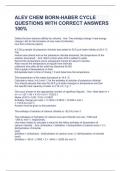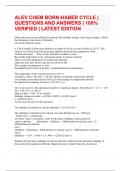Born haber cycle Study guides, Revision notes & Summaries
Looking for the best study guides, study notes and summaries about Born haber cycle? On this page you'll find 49 study documents about Born haber cycle.
All 49 results
Sort by
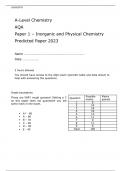 Popular
Popular
-
A-Level Chemistry AQA Paper 1 – Inorganic and Physical Chemistry Predicted Paper 2023
- Exam (elaborations) • 37 pages • 2023
-
- £8.63
- 1x sold
- + learn more
A-Level Chemistry AQA Paper 1 – Inorganic and Physical Chemistry Predicted Paper 2023 Name …………………………………………………………………… Date ………………… 2 hours allowed You should have access to the AQA insert (periodic table and data sheet) to help with answering the questions. Grade boundaries These are VERY rough guesses! Getting a C on this paper does not guarantee you the same mark in the exam. • A* - 90 • A – 80 ...
ALEV CHEM BORN-HABER CYCLE QUESTIONS WITH CORRECT ANSWERS 100%
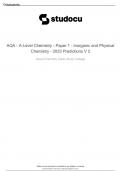
-
aqa-a-level-chemistry-paper-1-inorganic-and-physical-chemistry-2023-predictions
- Exam (elaborations) • 36 pages • 2023
-
- £14.38
- + learn more
aqa-a-level-chemistry-paper-1-inorganic-and-physical-chemistry-2023-predictionsA-Level Chemistry AQA Paper 1 – Inorganic and Physical Chemistry Predicted Paper 2023 Name …………………………………………………………………… Date ………………… 2 hours allowed You should have access to the AQA insert (periodic table and data sheet) to help with answering the questions. Grade boundaries These are VERY rough guesses! Getting a C on this paper does not gu...
ALEV CHEM BORN-HABER CYCLE | QUESTIONS AND ANSWERS | 100% VERIFIED | LATEST EDITION
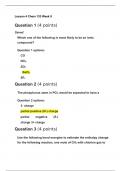
-
CHEM133 Week 9 Lesson 4 Quiz
- Exam (elaborations) • 12 pages • 2023
- Available in package deal
-
- £24.66
- + learn more
1. Question: Which one of the following is most likely to be an ionic compound? 2. Question: The phosphorus atom in PCl3 would be expected to have a 3. Question: The phosphorus atom in PCl3 would be expected to have a give CH3Cl and hydrogen chloride. 4. Question: How many of the following molecules have no dipole moment? 5. Question: Atoms having equal or nearly equal electronegativities are expected to form 6. Question: Element A has an electronegativity of 0.8 and element B has an electr...
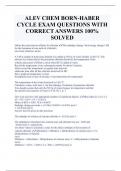
-
ALEV CHEM BORN-HABER CYCLE EXAM QUESTIONS WITH CORRECT ANSWERS 100% SOLVED
- Exam (elaborations) • 6 pages • 2024
-
- £8.63
- + learn more
ALEV CHEM BORN-HABER CYCLE EXAM QUESTIONS WITH CORRECT ANSWERS 100% SOLVED Define the term electron affinity for chlorine The enthalpy change / heat energy change / ΔH for the formation of one mole of (chloride) ions from (chlorine) atoms A 5.00 g sample of potassium chloride was added to 50.0 g of water initially at 20.0 °C. The mixture was stirred and as the potassium chloride dissolved, the temperature of the solution decreased. Start a clock when KCl is added to water Record ...
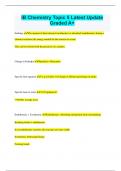
-
IB Chemistry Topic 5 Latest Update Graded A+
- Exam (elaborations) • 7 pages • 2024
- Available in package deal
-
- £7.39
- + learn more
IB Chemistry Topic 5 Latest Update Graded A+ Enthalpy The amount of heat released (exothermic) or absorbed (endothermic) during a chemical reaction (the energy needed for the reaction to occur) This can be lowered with the presence of a catalyst. Change in Enthalpy Hproducts -Hreactants Specific heat equation c= q in Joules (or Change in H)/mass(g)(change in temp) Specific heat of water 4.18 J/gdegreesC **NOTE: Usually in kJ Endothermic v. Exothermic Endothermic: Absorbing e...
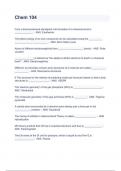
-
Chem 104 Exam Questions With Answers
- Exam (elaborations) • 10 pages • 2023
- Available in package deal
-
- £7.39
- + learn more
Chem 104 Exam Questions With Answers From a thermochemical standpoint, the formation of a chemical bond is _____________. - ANS Exothermic The lattice energy of an ionic compound can be calculated using the __________ _____________ ___________ - ANS Born-Haber cycle Atoms of different electronegativity form ________ __________ bonds - ANS Polar covalent ______________ is defined as "the ability to attract electrons to itself in a chemical bond" - ANS Electronegativity Di...
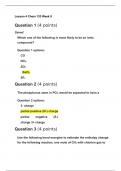
-
CHEM133 Week 9 Lesson 4 Quiz (All Correct)
- Exam (elaborations) • 12 pages • 2023
- Available in package deal
-
- £20.96
- + learn more
1. Question: Which one of the following is most likely to be an ionic compound? 2. Question: The phosphorus atom in PCl3 would be expected to have a 3. Question: The phosphorus atom in PCl3 would be expected to have a give CH3Cl and hydrogen chloride. 4. Question: How many of the following molecules have no dipole moment? 5. Question: Atoms having equal or nearly equal electronegativities are expected to form 6. Question: Element A has an electronegativity of 0.8 and element B has an electr...
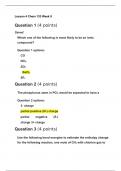
-
CHEM133 Week 9 Lesson 4 Quiz Questions and Answers APU
- Exam (elaborations) • 12 pages • 2023
- Available in package deal
-
- £19.73
- + learn more
1. Question: Which one of the following is most likely to be an ionic compound? 2. Question: The phosphorus atom in PCl3 would be expected to have a 3. Question: The phosphorus atom in PCl3 would be expected to have a give CH3Cl and hydrogen chloride. 4. Question: How many of the following molecules have no dipole moment? 5. Question: Atoms having equal or nearly equal electronegativities are expected to form 6. Question: Element A has an electronegativity of 0.8 and element B has an electr...

£5.50 for your revision notes multiplied by 100 fellow students... Do the math: that's a lot of money! Don't be a thief of your own wallet and start uploading yours now. Discover all about earning on Stuvia

